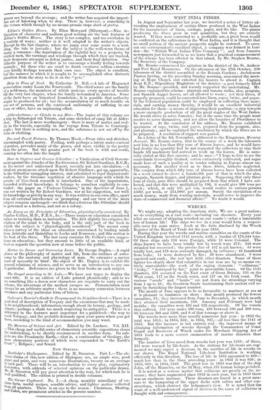WRECKS.
We might say, adopting the American style, We are a great nation; we do everything on a vast scale—including our disasters. Every year what an amount of shipping wrecked on our coasts !—what a lamentable loss of human life ! The ships we lose in a year would form a respect- able navy for some states. Look at the facts disclosed by the Wreck Register of the Board of Trade for the year 1855. During that year the wrecks and marine casualties on the coasts of the United Kingdom involved 1141 vessels, with a burden of 176,544 tons. Of these ships only 116 were Foreign, while 11 were Colonial. The ships known to have been totally lost by wreck wqre 272; 246 were stranded but recovered ; the precise fate of 167 is ndt known ; 55 were totally lost, and 178 were seriously damaged, by collisions; 49 foundered from leaks; 14 were destroyed by fire; 20 were abandoned ; 9 were capsized and sunk; the rest met with other disasters. Some of these figures too clearly show that calamities in our seas are by no means en- tirely unavoidable—the work of the raging elements : " collisions," "leaky," "destroyed by fire," point to preventible losses. Of the 1141 disasters, 576 occurred on the East coast of Great Britain, 251 on the West coast, 117 on the South coast, and 127 on the Irish coast. The various "sands" and " banks " are put down for strandings ving
from 1 up to 16 ; the Goodwin Sands maintaining their ancient re- pute by furnishing the largest number.
The month of June appears to be as favourable to mariners at sea as it is pleasant to landsmen on shore : that month produced the fewest casualties, 33 ; they increased from June to December, in which month they attained their maximum, 230. January and February were bad months : the casualties were 102 and 123 respectively. Of the vessels that suffered, 541 were under 100 tons, 496 between 100 and 300 tons, 98 between 300 and 1200, and 6 of that tonnage or above it. The wrecks were more than usually numerous last year : in 1852 the total was 1015 ; in 1853, 832 ; in 1854, 987,—all less than the 1141 of 1855. But this increase is not entirely real : the improved means of obtaining information of wrecks through the Commanders of Coast Guard and Receivers of Wreck under the Merchant Shipping Act of 1854 leads to a more correct enumeration of marine disasters than formerly. The number of lives saved from wrecks last year was 1388 ; of these, 251 were rescued by life-boats. As the stations for life-boats are aug- mented we may expect a decrease in the sacrifice of life in wrecks on our shores. The Royal National Life-boat Institution is working efficiently in this direction. The loss of life in 1855 amounted to 469— much less than in the three preceding years : in 1852 it was 920; in 1853, 689; in 1854, 1549. The great loss in 1855 was that of the ship John, off the Manacles, on the 3d May, when 191 human beings perished. It is noted as a serious matter that collisions are greatly on the in- crease ; they have augmented since 1853 in each year, but in 1855 there was an enormous increase. These disasters are traced in a great mea- sure to the hampering of the upper decks with cabins and other con- structions, which obstruct the helmsman's view. It is noted that the want of a well-understood signal of distress in the cases of collisions is fraught with sad consequences.
































 Previous page
Previous page